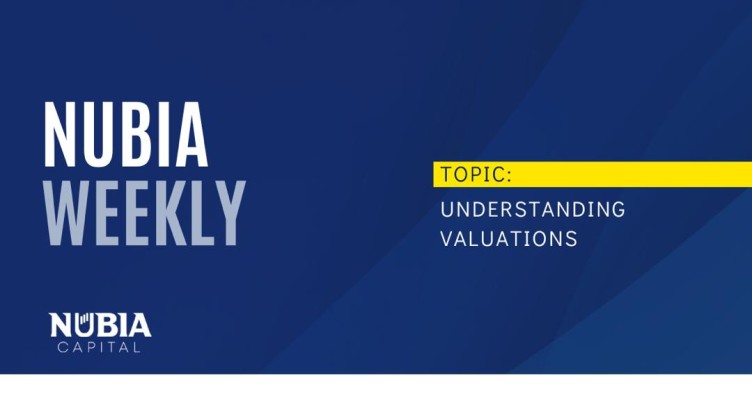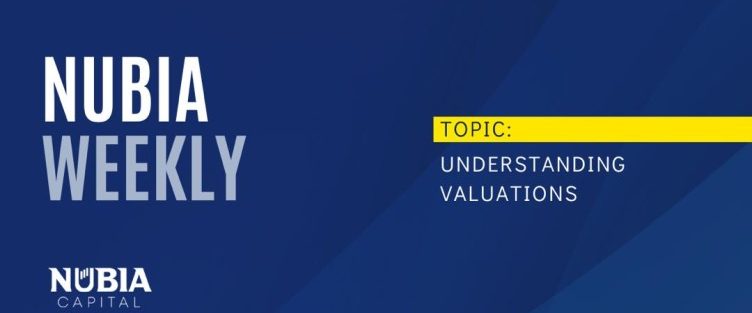
INTRODUCTION
Placing value on assets like real estate, vehicles, jewellery and personal property is relatively straightforward. These are assets with a physical form and so tend to have intrinsic value. Valuing these sorts of assets helps to determine an appropriate price and assists both parties in determining the true value of the property.
However, the process of valuing a startup is not so clear-cut. How is the value determined for startups with little to no traction, revenue, and profit? And for more mature companies with earnings and revenue, what factors are considered to determine the valuation?
Understanding Valuations
As seen in the ecosystem, we have early-stage startup founders who are excited and enthusiastic about their products and value their startups at millions of Dollars. At the other end of the spectrum, we have founders that have already gained traction in the market and value their startups more conservatively. However, valuations are not just random numbers that are simply plucked from the air and estimated.
Valuations are the price that helps to determine the worth of a startup. When raising capital, giving shares to the team and expanding the board, valuations go a long way in aiding an investor determine if they will go further with the startup.
Factors that are usually taken into consideration for valuations include:
- the product;
- the product market fit;
- the team;
- the industry or valuations of similar startups in that industry;
- sales;
- assets like intellectual property; and
- unique value proposition.
These factors are then evaluated and placed side by side with their qualitative value. This value is ultimately determined by the industry.
Valuations for early-stage startups
There are several valuation methods that are used by early-stage startups. One of the more popular ones is the Berkus method, a method propounded by Dave Berkus, a renowned venture capitalist of his time, and is explicitly used for reviewing and placing value on early-stage startups. Here, valuation is assigned to five key success metrics, each of which cannot be valued at more than $500,000. The idea is that it must lead to a maximum value of $2.5M and this is because Berkus predicts a soft cap of $20M in the fifth year, thus allowing for a ten times profit potential for the investors.
The five key metrics include the idea, the minimum viable product (MVP), the team, strategic relationships, and product/service rollout and sales.
An example will be used to illustrate this.
Team – The team is a great factor in valuing a company as it is the biggest ingredient for success. Thus, a particular startup in the fintech industry has a promising team of a second-time founder, and co-founders that have experience in traditional banking, product and marketing, therefore a value of $400,000 is given.
MVP – The MVP, which represents the prototype, is well grounded and doing its job of validating the product idea with real-life data thus giving a figure of $300,000.
The strategic partnerships, business model and results from initial sales are also evaluated and valued at $300,000 each.
In total, this early-stage startup is valued at $1.6 million. In general terms, this is a good figure, which shows the potential of the startup and most importantly a reasonable evaluation of that startup.
There are other methods, like the venture capital method which predicts the returns of the investor or the anticipated exit value, that connect with the post-money valuation and ultimately the pre-money valuation after subtracting the amount being asked for. It is the method of predicting the future values and financial state of the company and then calculating in a reverse order to attain the valuation.
Ultimately, the market conditions and economy determine the rise and fall of these figures.
Valuations for Growth stage companies
At the growth stage, the startup has reached a level of revenue, profit and a loyal customer base. Here, they are seeking additional investments to expand and solidify their establishment in the market.
In this case, investors are looking out for a sustainable business model and evidence of massive enlargement. There are also some qualitative factors that determine the valuation of a growth-stage startup which include the following:
Fundraising History/Existing investors
An investor will determine the fundraising history, take a look at the cap table and decide what kind of investor he will like to be. A startup with a history of investments from notable individuals and fundraising organisations is typically valued higher than one with many angel investors and not a remarkable board of advisors. The startup must also have a track record of using the money raised in a proper way and excellently to achieve product-market fit (PMF) and grow to a good enough customer base.
The Team
In any startup stage, the team will always be considered. As earlier stated, a great team is a pillar on which the idea is built into a successful company that can exit and return millions of dollars for the investor. Investors want to see that a startup has a strong team and leadership that can execute the business plan, restrategize and adjust according to the response of the market and ultimately lead the employees to success with a vision in mind. This is a qualitative analysis but a very important evaluation metric.
The Quantitative factors used to measure the value of a growth-stage startup include financial projections, market size and revenue/profit.
- Revenue/profitability: It is expected that at this stage, the company has made some profit and has an attractive monthly recurring revenue. However, even where this is not the case, the investors want to see that the startup has a clear path to profitability and can sustain itself for a long time. This is one of the highest determining factors of the valuation
- Financial projections: These are financial projections or the financial performance (cash inflows and outlays, expected revenue, expenses and future income) of a startup. In this space, this is a well-put-together spreadsheet document that shows the projected finances realistically. Investors are looking forward to financial projections that demonstrate a clear path to profitability and sustainability
- Market size: The market size is the potential for growth. Ideally, if all things remain equal, a company cannot grow past its market size. The market size is the potential of its finances and revenue. Therefore, investors look forward to investing in startups with a big and attractive market compared to a startup in a small niche market. This is also ultimately why there are more investors willing to pump in money to technology-enabled businesses than SMEs. The question asked is what is the potential to scale?
The DCF method (Discounted cash flow) is quite popular amongst growth-stage startups and is often used to discover whether an investment will be worth it using the value of future performance via a vis the value of what it is worth today.
It uses projections of a startup’s future free cash flow, then discounts it based on the Weighted Average Cost of Capital (WACC), which is the required rate of return or the hurdle rate, which investors expect to earn relative to the risk of the investment. However, a high discount rate is often applied to startups due to the high risk of their ability to generate the estimated cash flow.
Considering that this is quite detailed and is a full financial projection method, it is advisable to use the help of financial advisors.
Another method for growth-stage startups that is quite popular amongst venture capital investors is the market multiple methods as it provides a good estimate of what the market would be willing to pay for a startup.
The market’s multiple valuation methods estimate the value of a startup based on acquisitions of similar businesses in the market. It is also necessary to factor in the target startup’s stage of development compared to its peers. Based on the information gathered from these activities in the sector, the startup would use a base multiple to value the startup. To arrive at an estimate of the startup’s value, the multiple is multiplied by either the company’s revenues or its earnings.
Conclusions
Valuations are the figures given to a startup to determine its worth. These figures, though not ultimately calculated with a calculator, are determined by a number of factors depending on their sizes. These factors are also determined by the industry and geographical location. Nevertheless, regardless of which valuation methodology is eventually arrived at, it is advisable that startups have a fair understanding of what valuation means to their business and take steps to have an appropriate valuation that investors would consider as matching the stage of their growth.

- Launch a career in VC
Launching a career in venture capital (VC) is still very ambiguous. This is because VC is typically not a professional field taught in schools or universities. This is why we support the ecosystem in creating opportunities for more people to launch a career in VC.
Dream VC 2023 Cohort.
Dream VC is an investor accelerator for Africa. Their 2023 launch into VC fellowship application is now open. Launch into VC is a 12 Week Foundational Program for Junior Professionals keen on Breaking into the Venture Capital and Investment Space.
More information here: https://www.dream-vc.com/2023-livc-application
- IDICE FUND
Just last week, the Vice President of Nigeria, Prof. Yemi Osinbajo, launched the Investment in Digital and Creative Enterprises (iDICE) programme at the state house conference centre in Abuja, Nigeria.
The IDICE fund, consisting of contributions from the African Development Bank (AfDB), the French Government, the Islamic Development Bank, the Bank of Industry, representing the Federal Government of Nigeria and other private investors is an initiative to promote entrepreneurship and innovation among Nigerian youths.
This is a step in the right direction for the Nigerian ecosystem considering that a few years ago, the ecosystem was tagged harsh and unfriendly This with the recent emergence of the Nigerian startup act will in no doubt attract the right minds and investments to Nigeria while also creating an environment to sustain it.
More information here: https://www.afdb.org/en/news-and-events/frequently-asked-questions-idice-project-59933
- African startup ecosystem investments
We love and support the African startup ecosystem and Africa as a community of intelligent minds coming together to unveil the true potential of this ecosystem.
Launch of Delta40
Delta40 is a venture studio focused on building and investing in technology-driven businesses with a focus on agriculture, energy and mobility. This venture studio by Factor E acts as a cofounder assisting companies with product, marketing and venture building.
More information here: https://africabusinesscommunities.com/news/factore-ventures-launches-a-new-venture-studio-to-transform-the-african-startup-ecosystem/

Nubia Capital is dedicated to enriching Africa. We are now accepting pitch decks from growth-stage companies building in Africa.
Send pitches to info@nubiacapital.org




